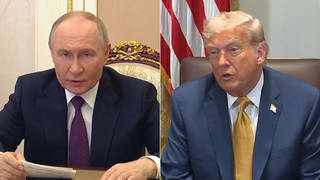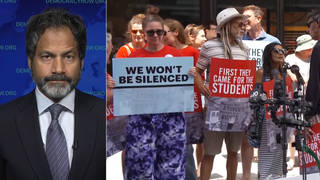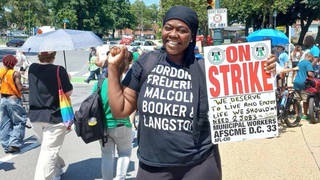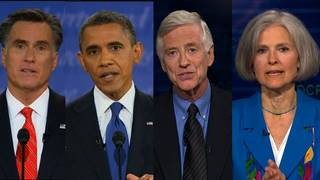
Guests
- George Farahfounder and executive director of Open Debates. He is also author of No Debate: How the Republican and Democratic Parties Secretly Control the Presidential Debates.
As President Obama and Republican challenger Mitt Romney prepare for their second debate tonight at Hofstra University on Long Island, we speak with George Farah, author of “No Debate: How the Republican and Democratic Parties Secretly Control the Presidential Debates.” The debate will feature questions from the audience that have been pre-selected by moderator Candy Crowley of CNN — a detail revealed when Time magazine published the contract secretly negotiated by the Obama and Romney campaigns and the Commission on Presidential Debates. [includes rush transcript]
Transcript
NERMEEN SHAIKH: President Obama and Republican challenger Mitt Romney will hold their second debate tonight at Hofstra University on Long Island. President Obama faces increasing pressure after what many deemed a lackluster performance during the first debate in Denver, Colorado, earlier this month. The Romney campaign has since received a boost in the polls and raised a record $170 million in September. Recent polls show the rivals are tied: an ABC News/Washington Post survey released Monday suggested 49 percent of voters are for the Democratic president while 46 percent support his Republican rival. On the campaign trail over the last week, Obama slammed Romney for recanting on many of his previous positions.
PRESIDENT BARACK OBAMA: These days, Mitt Romney is for whatever you’re for. Suddenly he loves the middle class, can’t stop talking enough about them. He loves Medicare, loves teachers. He even loves the most important parts of “Obamacare.” What happened?
NERMEEN SHAIKH: Meanwhile, Republican vice-presidential candidate Paul Ryan campaigned in his home state of Wisconsin and attacked the president for his handling of the national debt.
REP. PAUL RYAN: The president came into office saying he would cut the deficit in half in his first term. He has given us four years of trillion-dollar deficits. He has added almost more public debt than almost all previous presidents combined.
AMY GOODMAN: During this election season, as the Republican and Democratic candidates square off in the official debates, Democracy Now! has broken the sound barrier by expanding the debates to include the voices of third-party presidential contenders who were shut out, giving them equal time to respond. Tonight’s debate is the first this election to use the town hall format, featuring questions moderator Candy Crowley of CNN, she selects from the audience—a detail revealed when Time magazine published the contract secretly negotiated by the Obama and Romney campaigns that dictates the term of the 2012 presidential debates.
Tonight, Democracy Now! will continue our expanded coverage, this time from Hofstra University, where the debate is being held. We’ll host a community roundtable with guests from Long Island, then air the full, uninterrupted debate between President Obama and Mitt Romney. From 10:30 to 11:00, we’ll broadcast post-debate analysis.
And tomorrow on Democracy Now! we’ll play excerpts of the town hall meeting today and include third-party candidates also, in addition to Mitt Romney and President Obama, answering the questions. Our guests in studio will be Jill Stein, the Green Party presidential candidate; as well, we’ll be joined by Rocky Anderson, the Justice Party presidential candidate; and Virgil Goode of the Constitution Party.
But right now, to talk more about the debates themselves, we’re joined now by two guests. George Farah is the founder and executive director of Open Debates. He’s also author of No Debate: How the Republican and Democratic Parties Secretly Control the Presidential Debates. And we’re joined by Glenn Greenwald on the West Coast, columnist and blogger for The Guardian newspaper, author of With Liberty and Justice for Some: How the Law Is Used to Destroy Equality and Protect the Powerful.
We welcome you both back to Democracy Now! George, let’s begin with you. Last night, the contract between the campaigns was released for this debate. Talk about it. How long is it? What did you learn? How significant is it?
GEORGE FARAH: This is a 21-page contract that was negotiated by the Republican and Democratic parties, by the Obama campaign and the Romney campaign, and it dictates the terms of the presidential debates that we’re seeing this election season. This contract was not made public in 2008. It was made public in three prior election seasons only because we got copies from whistleblowers. So this is a fantastic primary document to see just how much the Republican and Democratic campaigns manipulate the process.
And there are some fascinating provisions that are harmful to our democratic process. First and foremost, the contract actually says that the candidates cannot participate in any other debate with any other candidate and the other sponsor. We had 27 Republican primary debates. Abraham Lincoln and Stephen Douglas debated seven times in 1858, but we’re only having three presidential debates, precisely because the candidates have contractually prohibited themselves from participating in any other forum.
And it gives the Commission on Presidential Debates a de facto monopoly over our most important election forums. Instead of allowing other organizations, like the League of Women Voters, to host exciting debates that might include some possible third-party voices, the commission is in total control of this process and allows the Republican and Democratic nominees to negotiate these very kinds of detailed contracts that eliminate spontaneity from some of the formats and exclude all viable third-party voices.
NERMEEN SHAIKH: George Farah, can you explain how was this contract revealed, if in the previous instances it was only through whistleblowers?
GEORGE FARAH: Time magazine’s David Halperin [sic] actually managed to get a copy of the contract. We don’t know how, but it was leaked. It wasn’t by virtue of the commission operating with transparency.
AMY GOODMAN: Mark Halperin.
NERMEEN SHAIKH: Mark Halperin, right?
GEORGE FARAH: I’m sorry, Mark Halperin, yes. The commission survives on a lack of transparency. In fact, the commission was denying this contract even existed. Mike McCurry, the former press secretary to President Bill Clinton, is one of the co-chairs of the Commission on Presidential Debates, and he repeatedly denied the very existence of this contract. When we confronted the executive director of the commission, Janet Brown, about the existence of a contract that’s dictating the terms of the debates, she said there is no such contract, the commission is not a party to it. Once some of the features of the contract started to come out, the commission then said, well, the contract is only about podium heights and temperatures in the auditoriums and whether the candidates can wear risers in their shoes, but denied that there was any substance.
Now that we’re actually seeing the contract, we’re seeing that for tonight’s town hall format there are extraordinary restrictions that are preventing there from being more unpredictable questions. We’re seeing the exclusion, of course, of all third-party voices according to the candidate selection criteria. And we’re seeing the prohibition on additional debates. We’re facing an unemployment crisis. We’re facing complex foreign policy issues. Why are we rationing debates, which are really the best antidote to money in our political process?
AMY GOODMAN: You’ve been on before talking about the Commission on Presidential Debates, what this is, but if you can once again just review how we came to this point in electoral politics, how the League of Women Voters had control of these debates wrested from them?
GEORGE FARAH: The League of Women Voters ran the presidential debate process from 1976 until 1984, and they were a very courageous and genuinely independent, nonpartisan sponsor. And whenever the candidates attempted to manipulate the presidential debates behind closed doors, either to exclude a viable independent candidate or to sanitize the formats, the League had the courage to challenge the Republican and Democratic nominees and, if necessary, go public.
In 1980, independent candidate John B. Anderson was polling about 12 percent in the polls. The League insisted that Anderson be allowed to participate, because the vast majority of the American people wanted to see him, but Jimmy Carter, President Jimmy Carter, refused to debate him. The League went forward anyway and held a presidential debate with an empty chair, showing that Jimmy Carter wasn’t going to show up.
Four years later, when the Republican and Democratic nominees tried to get rid of difficult questions by vetoing 80 of the moderators that they had proposed to host the debates, the League said, “This is unacceptable.” They held a press conference and attacked the campaigns for trying to get rid of difficult questions.
And lastly, in 1988, was the first attempt by the Republican and Democratic campaigns to negotiate a detailed contract. It was tame by comparison, a mere 12 pages. It talked about who could be in the audience and how the format would be structured, but the League found that kind of lack of transparency and that kind of candidate control to be fundamentally outrageous and antithetical to our democratic process. They released the contract and stated they refuse to be an accessory to the hoodwinking of the American people and refuse to implement it.
And today, what do we have? We have a private corporation that was created by the Republican and Democratic parties called the Commission on Presidential Debates. It seized control of the presidential debates precisely because the League was independent, precisely because this women’s organization had the guts to stand up to the candidates that the major-party candidates had nominated. And instead of making public these contracts and resisting the major-party candidates’ manipulations, the commission allows the candidates to negotiate these 21-page contracts that dictate all the fundamental terms of the debates.
NERMEEN SHAIKH: But who runs the commission, and who funds it?
GEORGE FARAH: The commission is co-chaired by two individuals: Frank Fahrenkopf and Mike McCurry. Frank Fahrenkopf is the former chair of the Republican Party and the nation’s leading gambling lobbyist. He’s the president of the American Gaming Association. And Mike McCurry is the—yeah, Mike McCurry is the former press secretary to Bill Clinton.
AMY GOODMAN: Well, it’s a good bet for both parties.
GEORGE FARAH: Exactly. And he’s also the—lobbying on behalf of the telecommunications industry. These are men who have demonstrated repeatedly a willingness to sacrifice our democratic process for what they perceive to be either financial interests or political interests. And the commission is largely financed by private corporations. The entity that’s given the most amount of money to the Commission on Presidential Debates is Anheuser-Busch. Our presidential debates are brought to you by Bud Light. And they’ve given millions of dollars to the Commission on Presidential Debates, in which—
NERMEEN SHAIKH: But what do these corporations stand to gain for funding the commission on the debates?
GEORGE FARAH: First, the just nice advertising, of course. They get to—you know, Philip Morris sponsored one of the presidential debates, paid $250,000 and got to hang its banner in the post-debate spin room that was seen throughout the country. But more importantly, they get access, and they get to show support for both major parties.
AMY GOODMAN: The major parties on their podiums have Bud Light on the podium?
GEORGE FARAH: Not yet. We’re getting there. We’re getting there, Amy. But they get to show support for both major parties. How often can corporations find a way to make a single donation that strengthens both the Republican and Democratic parties and get a tax deduction for that kind of donation? So it’s a rare contribution. And it also gives them access. They get to go to the actual debate themselves and rub shoulders at private receptions with the campaigns and their staff.
AMY GOODMAN: The CEOs of these companies.
GEORGE FARAH: Yeah.
AMY GOODMAN: Like the International Bottled Water Association.
GEORGE FARAH: Exactly. It’s fascinating that liquids are the principal sponsorship of the presidential debates this year.
NERMEEN SHAIKH: Well, after the contract was revealed yesterday, a member of the commission, a Newton Minow, and the former chairman of the Federal Communications Commission, defended the criteria at least for the exclusion of the vast majority of candidates. He said, “There are 410 candidates. Let me repeat,” he said, “410 candidates for president registered with the Federal Election Commission. Do you really want to have 410 candidates in the debate?” Is that right that there are that many, and that’s what—if inclusion were not restricted in the way that the commission has restricted it, would all of these candidates have to participate in the debate?
GEORGE FARAH: Absolutely not. And this is part of the commission’s propaganda. They like to say every four years that hundreds of candidates run for president every four years, including Joe Crustacean the Crustacean Liberation Party that wants lobsters to colonize the moon. He runs every four years. But these candidates are not on enough state ballots to come close to having a mathematical chance of winning the White House. If you just say, “Let’s include all the candidates in this election cycle that are actually on enough state ballots to have a chance to actually win the White House,” we have four, maybe five, candidates in total, and that’s including Obama and Romney. We had seven, eight candidates in the Republican primaries. So, even having the most liberal candidate selection criteria would only result in five candidates.
And if you ask the American people—if we’re going to use polling to actually determine who gets to participate in the debates, which is what the commission does—the commission says a candidate must reach 15 percent in the polls to participate in the presidential debates, which, if you apply that criteria historically, excludes every third-party candidate for the last 100 years from any conceivable presidential debate. But if we’re going to use polling criteria, why not simply ask the American people, “Who do you want included in the presidential debates?”
AMY GOODMAN: Speaking on MSNBC’s Morning Joe on Monday, Mark Halperin said both the Obama and Romney campaigns had expressed concerns about the role of the moderator in tonight’s town hall session.
MARK HALPERIN: Candy Crowley, who’s moderating the town hall on Tuesday, has got a unique challenge, as compared to the other moderators. The commission and the campaigns want this to be driven by the questions that come from the people chosen by Gallup to ask questions, citizens who are likely voters. And both campaigns have been struck, as has the commission, by some of the interviews that Candy has done talking about her role and what she envisions her role to be. The campaigns and the commission envision a much more limited role than they’ve heard her describe. And things are a bit in flux. It’s clear that the campaigns have asked the commission, as I report, to check with Candy, to say, you know, “Do you get the fact that we think this should be very a limited role—very few follow-ups, basically just traffic cop after an audience question?” And it remains a little bit unclear at this point about if she envisions this role the way the commission and the campaigns do or whether she wants to play a more active role in following up after they’ve answered the question from the citizen.
AMY GOODMAN: That’s Mark Halperin of Time, who released the contract between the Obama and Romney campaigns, George Farah, talking about the candidates’ concerns about the role Candy Crowley will play.
GEORGE FARAH: The town hall debate we’re going to see tonight is the most constrained and regulated town hall debate in presidential debate history. The first town hall debate was introduced in 1992, and no one knew what anyone was going to ask, none of the audience members were going to ask. The moderator could ask any follow-up questions. It was exciting, and it was real.
Well, President George H.W. Bush stumbled in response to an oddly worded question about the federal deficit, and the candidates—the campaigns have panicked and have attempted to avoid that kind of situation from happening again. In 1996, they abolished follow-up questions from the audience.
In 2004, they began requiring that every single question asked by the audience be submitted in advance on an index card to the moderator, who can then throw out the ones he or she does not like. And that’s why the audience has essentially been reduced, in some ways, to props, because the moderator is still ultimately asking the questions.
And this election cycle is the first time that the moderator herself is prohibited from asking follow-up questions, questions seeking clarification. She’s essentially reduced to keeping time and being a lady with a microphone.
AMY GOODMAN: It’s interesting you say that, because Carole Simpson was just on, from ABC, talking about the role of women in these debates. You had Martha Raddatz, who was the questioner of the vice-presidential candidates, not the presidential candidates, and then Candy Crowley holding the microphone. Now, of course, she can choose the questions this morning, as she’s going to be reviewing them. And the person who’s called on, I suppose, doesn’t have to ask that question, who—
GEORGE FARAH: We don’t know, exactly. Who knows what kind of spontaneity is going to happen? But there is something ugly about having the League of Women Voters losing control of the presidential debates to the commission, co-chaired by two men who then reduce all female moderators to kind of sideshows and trivializing their role in the actual presidential debates.
AMY GOODMAN: We’re going to break, come back to this discussion. We’re talking to George Farah. He’s executive director of Open Debates. I’m Amy Goodman, with Nermeen Shaikh. We’ll be joined by Glenn Greenwald, as well, when we come back.













Media Options